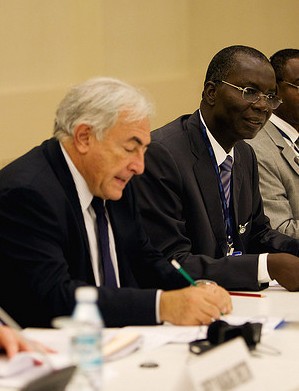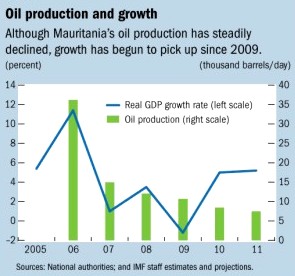|
Mauritania Economy - Development Optimism back in Mauritania, without oil
According to IMF analysts Boileau Loko, Abdelrahmi Bessaha and Younes Zouhar, Mauritania's government was just given "a vote of confidence for the country's economic reforms" by the International Monetary Fund (IMF). After 19 months of frozen ties, the first IMF disbursement of a three-year loan was agreed on.
Today, "Mauritanian authorities have made good progress in re-establishing macroeconomic stability," the IMF analysts hold. "Inflation is projected to remain in the single digits, while rapid credit growth, a strong pickup in exports, and a rebound in industrial production point to robust growth in the non-oil sector." Non-oil real GDP is expected to grow by 5.6 percent in 2010 and 5.5 percent in 2011, supported by strong activity in the agriculture, mining, and construction sectors. Thanks to higher prices and production levels of Mauritania's iron ore, gold, and copper exports, the fiscal and external positions could improve, they hold. The analysts also hold Mauritania has a "solid reform agenda." Reforms focus on achieving fiscal consolidation; creating more room for higher social and infrastructure spending; maintaining low inflation; improving the business environment to support broad-based private sector–led-growth; and strengthening social protection and safety nets. In a move to signal a strong commitment to the reform agenda, Mauritania's central bank lowered its policy rate from 12 to 9 percent in November 2009 and restored the foreign exchange auction system in mid-December 2009. The system had been suspended in late 2008 following an acute shortage of foreign currency. As with many low-income countries, the main goal is to achieve high and sustainable growth in order to boost employment and reduce poverty. Almost one out of two Mauritanians lives below the poverty line, and a large segment of the population remains subject to food insecurity. "Progress has been made in many areas, but private investment is still low, in part because limited infrastructure and an unfavourable business climate continue to hamper economic growth," according tot he analysts. Diversifying the economy is seen as essential to reducing Mauritania's vulnerability to external shocks, since the mining sector represents nearly 75 percent of exports but less than 3 percent of employment. "Meeting these challenges will require sound macroeconomic policies and the steady implementation of structural reforms," the IMF analysts claim. By staff writers © afrol News - Create an e-mail alert for Mauritania news - Create an e-mail alert for Economy - Development news
On the Afrol News front page now
|
front page
| news
| countries
| archive
| currencies
| news alerts login
| about afrol News
| contact
| advertise
| español
©
afrol News.
Reproducing or buying afrol News' articles.
You can contact us at mail@afrol.com









